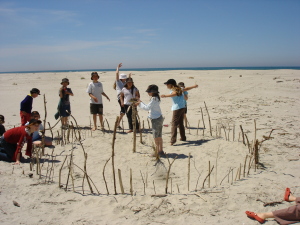Warrington School/Maths
Contents
Warrington School Mathematics curriculum
Children learn to:
1. Enjoy and incorporate mathematical processes in everyday life.
2. Be confident in the use and recall of basic facts, including addition, subtraction, division and multiplication.
3. Develop skills of logical reasoning and problem solving strategies.
4. Estimate, predict and approximate answers and be able to self check and correct workings for accuracy.
5. Develop understandings in the areas of number and algebra, geometry and measurement, and statistics.
6. Communicate and present mathematical ideas, clearly and accurately.
The Numeracy programme
Key question - Which is more important - knowledge or strategy?
Numeracy Levels
Stage 0: Emergent
The student is unable to consistently count a given number of objects because they lack knowledge of counting sequences and/or one-to-one correspondence.
Stage 1: One-to-one Counting The student is able to count a set of objects or form sets of objects but cannot solve problems that involve joining and separating sets.
Stage 2: Counting from One on Materials The student is able to count a set of objects or form sets of objects to solve simple addition and subtraction problems. The student solves problems by counting all the objects.
Stage 3: Counting from One by imaging The student is able to visualize sets of objects to solve simple addition and subtraction problems. The student solves problems by counting all the objects.
Stage 4: Advanced Counting The student uses counting on or counting back to solve simple addition or subtraction tasks.
Stage 5: Early additive Part-Whole The student uses a limited range of mental strategies to estimate answers and solve addition or subtraction problems. These strategies involve deriving the answer from known basic facts, (eg. doubles, fives, making tens).
Stage 6: Advanced Additive/Early Multiplicative Part-Whole The student can estimate answers and solve addition and subtraction tasks involving whole numbers mentally by choosing appropriately from a broad range of advanced mental strategies (eg. place value positioning, rounding and compensating or reversibility). The student uses a combination of known facts and a limited range of mental strategies to derive answers to multiplication and division problems, (eg. doubling, rounding or reversibility).
Stage 7: Advanced Multiplicative Part-Whole The student is able to choose appropriately from a broad range of mental strategies to estimate answers and solve multiplication and division problems. These strategies involve partitioning one or more of the factors, (eg. place value partitioning, rounding and compensating, reversibility).
Stage 8: Advanced Proportional Part-Whole The student can estimate answers and solve problems involving the multiplication and division of fractions and decimals using mental strategies. These strategies involve recognising the effect of number size on the answer and converting decimals to fractions where appropriate. These students have strongly developed number sense and algebraic thinking.
Problem solving
In a range of real life contexts, solve problems and model situations using mathematical and statistical knowledge and strategies at students relevant level.
Envirethical mathematics
Mathematically concepts that give a greater understanding of the happenings in the world. This may take the form of understanding:
- Tables and data of world populations
- Maps showing latitude lines and linking this to time, seasonal changes and climate.
- Gross domestic product of a nation and how this influences currency fluctuations and its effect on a nation.
Junior School
Structured based around 80% numeracy and algebra, and 20% statistics, geometry and measurement.
Aims: Number recognition to 100
Middle School
Numeracy and other strands learnt in context
Aims:
Timestables to 10
Above advanced counting
Senior School
Numeracy project but emphasis on using maths within context – solving of real life problems All times tables and basic facts up to 10.
Aims: Independently and collaboratively solve mathematical problems of an abstract and practical nature. Use mathematics from an envirethical viewpoint.

